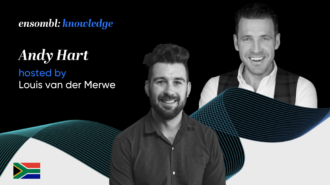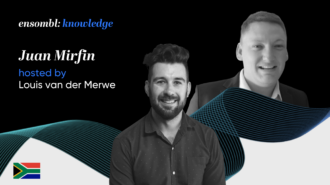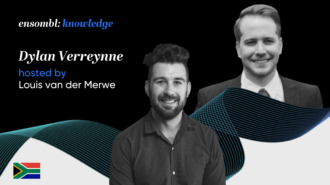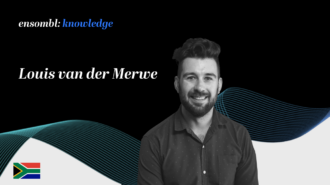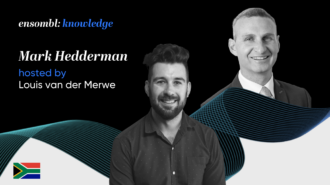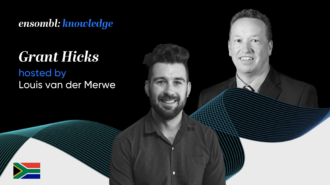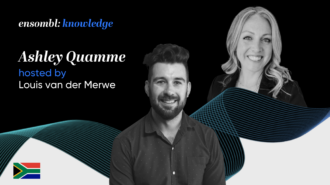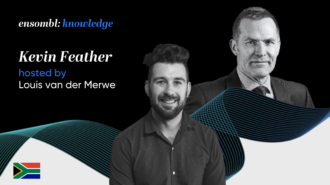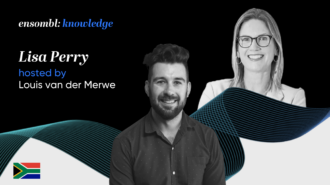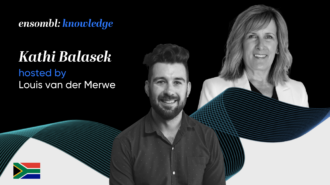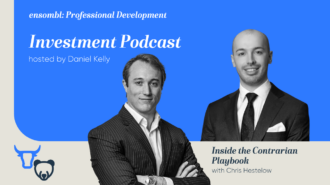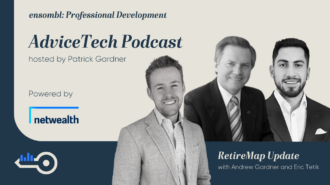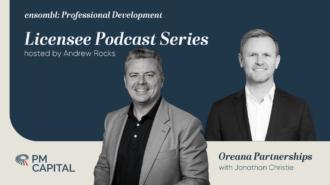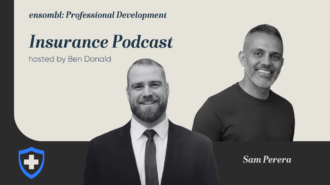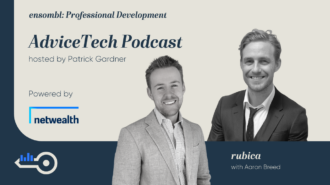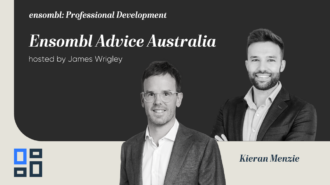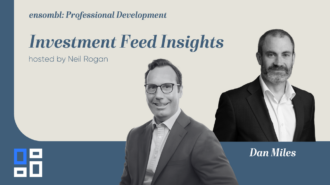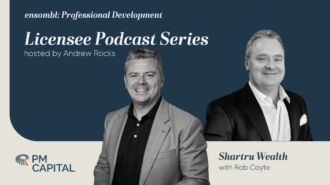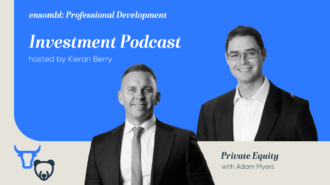Louis van der Merwe
Welcome to another episode of Financial Planners, South Africa. Today in the studio I have with me Mac Gardner. Mac is the CEO, the chief education officer at Fernleigh. Tech, the author of two books, including The for money Bayes, which is one we’ll chat a little bit of art today. And super passionate about educating clients. Mac, thank you so much for joining me today.
Mac Gardner
Louis, thank you so much for having me truly an honor. And a pleasure to to join you on your show today.
Louis van der Merwe
Mac, your name popped up on LinkedIn quite a few months ago, and kind of what struck me is that this passion for educating people, but specifically educating kids, like starting at a really young age, and what I loved about it is how you simplified financial planning. And so looking at the for Money Bears, it’s a concept that I started using chatting to our clients. Give us a little bit of a backstory, how did the four money base come about?
Mac Gardner
Sure. The the idea of the four money bears came about, actually through my first book. So my first book is titled motivate your money. I had my practice in Houston. And I, I’ve been blessed to have been in this business for 20 plus years, and I’ve worn a lot different hats, right? So started off in retail banking, and then I went to trust administration. And then I did commercial corporate lending. And then I did corporate 401k plans, and then you know, financial planning. So I have all these years experience. And the thing that was very surprising to me, was that so many of the people that I was working with, and these were millionaires in the people that had money, didn’t have a lot of basic financial planning, education, understanding. And I was like, wow, this is interesting. So my first book is titled motivate your money. And I wrote that one for adults. So adults could have, you know, baseline understandings, a certain concept that we take for granted in the business. And I have my Mac nuggets, little, little, little words, or sayings or you no idea. So just simplify stuff for adults. One of my clients came to me, Louis, and was like, hey, Mack, love the Mac nuggets, love motivate your money? Would you be open to writing something or creating something for kids, and we both had elementary school students at the time. So I was like, Okay, how old she said, like elementary school. Should be fun. So my first book, I talk about the five steps to financial success, you have to plan accordingly. Spend cautiously, save diligently, invest wisely and give generously. These are just five steps that folks I’ve been working with for years, unbeknownst to them, they were doing it and you know, they had money to retire to pass on for legacy planning. And so I said, Okay, well, how could we dilute this or make it something where a child can understand and I said, Well, there’s only four things you can do with money, spend it save an investor to give it away. And that is how the for money bears came to be spend a very save bear investigator and prepare,
Louis van der Merwe
I think it’s so brilliant that you simplify it. And you’re like moving down apart from just generating that income. Like looking at these three areas of for at least four areas, the four things that you can do. The one that often seems a mess, to me is the Giver Bay. Right? In conversations with clients, it doesn’t always come up, you know, we’re, we’re used to thinking of legacy planning, and oh, I’ll leave some of that money behind when I pass away or often associate that with older clients. How do we bring that into our conversations as financial planners with younger couples that might have a budget that’s super tight? Like, how do you see that give a component fit into their budgets? And also, then, you know, what does that bring to them when they get it? Right.
Mac Gardner
But one of the areas that we really were looking at with the full money bears book, is the early awareness. And we believe the earlier a person understands what their options are with money. And the earlier they can start doing these things with money. It’s easier for them to do it when they’re adults. So case in point, I do this thing called the $100 bill challenge. I go to elementary school, and I take out this $100 Bill, and I’m like, Okay, first and foremost, there’s no answer you can give me to get this $100 Bill, okay, kids, you know, the kids start laughing and everything, but it gets their attention. And I asked him, I say, hey, look, if I give you this $100 Bill, what would you do with it? Nine out of 10 kids raise their hand and they would spend it. And what it really started to show us though is is that children are conditioned to consume from a very early age. And so kids understand the spend, and they understand the say, right, they know they put money in a piggy bank. And for the most part, that’s it. So what our thought process is, we need to explain to them that they have four options, right? You can do things other than just spend it to save it and those two other options are really ortant not just in your life today, but in the future as you become an adult. And those two other options are the ability to invest the money to make it grow, and the ability to give to others, because there’s always going to be someone less fortunate than you. And it’s important to have these habits in your life early, so that when you are in your 20s, and you’re sitting with a financial advisor, we’re not prying them to do it, because they’ve already been doing it, they’ve been doing it from failure very early age. And then they can understand that benefit and how it not just helps their community but helps them as well,
Louis van der Merwe
Mack, that actually reminds me yesterday, I was reading a book, from one of the authors from Gallup, that spoke about wellbeing and one of the elements is community, and how they were sharing how giving back and uplifting your community adds so much to our personal well being. And so now it’s this thought of a financial planners are playing in the area of wellbeing and bringing in money to facilitate that. Yeah. So we look
Mac Gardner
at this bigger picture of financial wellness. And one of the reasons why we started Finland tech is our mantra is to build a bridge between financial literacy and financial technology, we believe there’s a formula to the financial wellness space that people are trying to get to, these are our clients, these are financial advisors trying to help their clients. So there’s the financial literacy, right, which is education, extremely important, you need to have that education out there. But there’s a problem, you need the financial capability, you need to give people the tools in order to reach financial wellness, right. So in our mind, with regard to the four buddy bears, the book is a neat tool, we’re developing an app called the Four money bears Berryville. And the idea is, okay, here’s education, we’ve got that here. And now the tools to be able to allow an advisor to say to a client with a young child, hey, play this game, understand these concepts, implement these concepts, and then take that into the real world. Alright, so that’s why I think technology and fintech has a big, big part, it plays a big role in helping a society, you know, and all these communities get better. Because we can have this education, we can provide these tools, digital tools, and we can leverage these digital tools and provide them to communities that have been underserved and overlooked for years. So yeah, I totally agree with you. Financial wellness is where everyone’s trying to get to. And we live in a time where there’s technology being developed to really enhance that and get us there a lot faster than we may have in the past. Can we maybe
Louis van der Merwe
talk a little bit about practically how that would work? So if I understand this correctly, the child would install this on their iPad or iPhone, they’d be able to play the game or like whatever platform it would be available. What would be what would this game be a bad like? It’s share a little bit about that?
Mac Gardner
Yeah, we this is funny, because when we wrote the for money bears book, we really didn’t expect to get this sort of feedback that we did the response that we did. I wrote it years ago and proud to say that we act we have global, a global brand that we’re developing really when we have sales in Canada, South Africa, UK, France, Germany, it’s really amazing. And what it shows us is that financial literacy is not just a US problem. It’s a global issue. But what some of the feedback that we will get is Mac love that you wrote this book to teach kids about what to do with money once they get it. Or you’re writing a book to teach kids how to earn money, because that’s pretty important too. And so what we decided to do with the full money bears Berryville app is to create a game of FIDE financial education solution that teaches what I call both sides of the personal finance fence. And here’s what I mean, the premise of the game it’s, it’s a farming game, you inherit your family’s berry farm, and so you have to take care of the farm and you have to earn money through farming these berries. So that’s the entrepreneurial side that we’re looking to really engage on people and then once you’ve earned the money, we now have the full money bears interacting with the player to provide quests and quizzes and give guidance on what to do with the money now that you have it so that’s really the the the overall premise of the for money bears berry violist is to help help engage young people and serve as the source of their first digital financial education experience. This sort of digital lemonade stand,
Louis van der Merwe
Mac that is brilliant. I remember growing up playing a game called Theme Hospital and you also had a bank account and you were running a hospital and kind of a teacher’s you thinking back now teaches you ideas of business, right? It’s life skills that is so desperately needed. And obviously, you are extremely passionate about financial literacy. How do you couple that with kind of finding shorter term evidence that you are moving the needle? Because these things are 30 year plans, right? You’ll only see the fruits of bear evil, excuse the ban 30 years from now, like, what are the short term measures that you’re looking at to see if you if you are moving the needle or moving in the right direction?
Mac Gardner
Okay, I love that question. And just for everyone listening, you did not prep me with that question before this conversation. But so with the four money bears Berryville, what we’ve done is we’ve developed a new methodology for delivering financial literacy. And we call it the tap method to a tee. We teach, we analyze, and we track the progress. And the question you pose, it always is so important, because financial literacy to this point has been very sort of one and done. Like you give a kid a book, hey, read this book, and all of a sudden, you’re financially it doesn’t work like that financial literacy, education is based on and derived from behavior, behaviors, early healthy financial behaviors, right become, you know, financial traits, and then eventually become who you are as a person. So habits, behaviors and traits is what I like to say, that is really key to our game, this abuser. And it’s not just for kids, by the way, my developers always say Mac is not just for kids, it’s seven classes. So adults can play this game, anyone who wants to play and learn about money can play this game. But the whole idea is for us to be able to teach financial literacy utilizing the game, analyze what this user’s doing. From a young person perspective, we have this hypothesis that most kids are going to be spenders. And most young people are going to be spenders in this game. And so we’re going to be able to, to analyze what they’re doing and sort of nudge them to do different things and try different things with their money, investing, saving, and giving, so on and so forth, and then track that progress over time, to be able to show the parent who’s going to get a report, say, hey, this how your child is doing, or for enterprises, financial institutions, banks, we’re working with banks that have Community Reinvestment Act divisions that want to be able to say, hey, we’re giving back to the communities. But we’ve never been able to track the data on how well these people are doing, or any of this stuff is working. That’s what our platforms gonna be able to do. So it’s it is a fun teaching platform. But it’s also going to be able to collect this data, and really show folks over time, hey, look, this is the progress being made in these communities, and these areas through a game.
Louis van der Merwe
I love how you put that that it’s actually a behavioral change. But the work that we do with our clients and the future generations is about changing habits, it’s about making decisions that you know, will leave a lasting impression and build additional wealth and help other people. But why is that so difficult to change someone’s behavior.
Mac Gardner
So from the financial literacy side, we talk about the aspect of socialization a lot. If you look at our deck and look at the work where we put together and put out there, we talk about language and food and certain things in our lives, just becoming a part of who we are, because it’s socialized at a very, very early age, right? I like to say that all we are at the end of our days, and this is a collection of stories, we literally just go through life hearing and sharing stories. And our children, right, if you’re a financial planner, if your financial advisor, our kids are going to be lucky to hear what stocks are what bonds are like budgeting is important, you know, 401, KS, Ira, all those things. Nine out of 10 kids don’t hear this stuff, because they don’t go up in households that are CFPs or CPAs, or what have you. And so our thought process is if we can get this book into the hands of kids or families with young kids, and then all of a sudden, the narratives in these households change the stories in these households change. And when this child gets $100, for a birthday, or for whatever, you know, holiday, instead of running out and blowing it on sneakers or toys or candy. They can sit down with mom and dad and we haven’t talked about that bridge yet. But I’d love to talk about that further down in the conversation. But they can now look at mom and dad say hey, you know what, let’s take $25 and buy something cool. Let’s take $25 and put it in a piggy bank or put it somewhere. The technology is around that allows people to buy fractional shares so a child can buy $25 Worth of Nike, or Coca Cola, or whatever, or five bucks or whatever, and then give $25 to someone else. So that’s really what we’re looking to do with the book. And then the apple game just expands that and allows us to scale the story and scale the resource a lot easier.
Louis van der Merwe
So Michael, you’re talking about real actual money that’s going into account that they would allocate? Or would it be kind of a ghost portfolio that you often see these simulators work.
Mac Gardner
So for the game, it’s educational, that’s how we’re starting it off. But we’ve been approached by FinTech companies, financial institutions, who want to be able to utilize our game on their platform. So if you’re a bank, and you’re playing the game, you can push a little button and then connect to that bank and you know, maybe see your account, so on and so forth. But we, what we found is that there’s a bunch of FinTech out there to help you do stuff with your money, banking, investing, lending, insurance, there’s not a lot of FinTech out there to actually help teach you what to do with your money. And so that’s the lane that we’re really looking to stay in early in the development of the game. But guess what each beer represents some function of money, right? And there’s going to be opportunities for, you know, banks, investment companies, insurance companies, not for profits, to incorporate our game and into their, into their platform somewhere.
Louis van der Merwe
I think it’s so important to make sure that there isn’t misaligned incentives, right, because oftentimes, we see that the education is aligned with whatever product that company or institution is selling. But you’re saying like, let’s give you a proper basic understanding. At what point does it get more advanced? At what point do you approach things like credit, and like lending like insurance that you mentioned?
Mac Gardner
Yeah. So we have been working on our second book and a bevy of new characters, banker, box turtle, lender, Lion, omnibus owl and crypto cat, we’ve actually developed the character that we’ll be teaching. Yeah, I know, everyone loves crypto cats, like Oh, my God, one more parent asked Mackey developing something, they’ve helped me teach my kids about cryptocurrency. But that’s definitely in the works. The thought process with the full money bears is, you know, those four functions of money loose, they’re never going to change. At least, I don’t think in any of our times, those four functions, what how we envision the for money bears platform is, you know, we can have sort of a pack for elementary school, right, and then a pack for middle school, a PAC for high school, and then just have those four concepts, but just have the outputs and have the content on the platform, you know, engaging different age groups, so that we can talk about all these different things. But yeah, I think you’ve got a great point, we need to be able to meet people where they are when it comes to financial education, which is why we decided a gamified solution, because our target demographic is no elementary school that have you know, five to 10. But we’re also working on other other ideas, concepts and platforms to engage the full spectrum of consumer out there.
Louis van der Merwe
So Mac, just like these books out there to help parents with the birds and the bees conversations, there will now be a book tab with the bay conversations. Right?
Mac Gardner
Exactly, exactly. And it’s funny what some of the responses that we’ve got from parents who have bought this book for their kids is in a Mac, thanks for not making this book to Kitty or too babyish. Because parents, we have worksheets in the book, and parents who will flip through and like, Oh, thanks for explaining what a stock is, what a bond is, you know, real estate and precious metals, all these different things, we’re investing all these different ways that you can give back. But what we found is that in the process of educating the child, a lot of times the parent gets some good nuggets of information as well. And we want this to be from the book and for the game, a collaborative experience, where everyone in the household is learning
Louis van der Merwe
what surprised you most of creating this and just putting it out in the world,
Mac Gardner
honestly, where it’s gone. And the the amazing stories that I get to share one with you that that moves me to this day. I had a colleague in, in Florida, you know, gave her a copy of the book for she has young children. She’s in banking, investment banking, and she said she said she’d never forget, she gave the book to her son, son came and she’s getting ready in the morning to go to the office. The son came in with a book and said, Mama, I want to buy a Maserati when I get older, if I want to buy a Maserati, I have to be an investor bear and it it in that her child was like six or seven years old. And she was like, I didn’t think he could understand and make that connection. But in this child’s mind, he saw that investor beer is the one that allows your money to grow and grow more. So in order for him to make a lot of money to afford this car, that’s what he needs to do with his money. So it’s just hearing those stories of young people getting it. And I think a lot of times parents take take their kids for granted that they won’t understand this stuff, or you know, it’s above their pay grade. But there was a Cambridge study that came out that shows the child’s connectivity with money actually starts by age seven. So by age seven, they’re listening to mom and dad. And in fact, the first behavior financial behavior child picks up is their parents spending habits. So that’s really the cool thing, I think, is really hearing the stories about how parents and their kids are looking at money differently. Because of our book,
Louis van der Merwe
that’s so true. And in our conversations with clients, we often ask what your earliest memories around money, and how has that shaped you. And these are things we carry around 40 5070 years later, when we make decisions of how to invest our retirement savings, or which pension D to use the things that shaped us. Back in the day,
Mac Gardner
I talked about the three R’s of our relationship with money and starts really early in life. The first R is you know, as a child, someone puts money in your hand and you realize this is money. So that’s the first all you realize the second Rs, you recognize what it does, right? And so if you’re a young person, and someone says, Hey, with this money, you can go to store and buy something, or you put your piggy bank and you can save it, you start recognizing what it does. And then that third R is you start to rationalize how to use it. Right? Okay, I know what it is, though to does this, I’m going to use it. So now imagine that now you’ve expanded the awareness of an individual from not just two functions to four. And now there’s this realization, and then recognition that they have these other options. Imagine well, how you then rationalize what to do with it to your point, hey, I can invest this money. Okay, if I started, imagine, imagine a young person at age seven, starting an investment portfolio. You know, you we talked about the wealth gap, you talked about all these inequalities around the country, but just providing the education and the tools for young people imagine the runway, now you’ve got a 3040 5070 year runway, because you started investing when you were seven, and not in your 20s, as most people do, and then giving and all these other functions are things you can do in your community, because you started a practice of giving money to either communities or organizations from a very, very early age. And that’s not part of your DNA. I think amazing things can happen in our society,
Louis van der Merwe
Mac that hits home, because in South Africa, where the country with the largest gap, the largest inequality, they measure a true Gini coefficient, I’m sure you know, but I get that that is the problem that we as a country are grappling with. And yet the friction is so low for people to spend, and for people to borrow money. And as we’re getting more and more digital, you know, it’s you don’t even need to carry a card anymore. You can just tap your phone. And there you go. Like, are we moving away from actually realizing and rationalizing the value of monies like specifically for our kids?
Mac Gardner
I think we could. I’ve talked to folks about how technology is changing our ability to to spend and our ability to interact with money and how that is it because it’s making it so easy to do, that the need for more education is greater, right? When you’re when we’re in a cash based economy, and you had that $10 in your hand, you pretty much that $10 is what you get, you know, now we’re in a an economy where credit is a lot easier to get. It may be high costs, but it’s easier to get. And you’re not constrained by that physical cash anymore. To your point, we just got a phone, you got something on here, and then you just go and you boop. And and all of a sudden, if it’s more effective and efficient to spend, that’s great for the economy and great for these consumers. But these businesses, but how great is it for the end consumer who’s never gotten the education to say hey, look, you can’t just spend everything, you’ve got to start giving your money purpose and given the missions to do certain things. So that’s why I think it’s we’re in an age where it’s really important to start exposing younger folks to these functions of money and what what their options are so that they don’t fall into these traps to just go ahead and consume willy nilly and all of a sudden find themselves in a ton of debt. This is helpful for our profession to because I tell people, you want an educated client, you want a client that has a need for us that views what we do as important, because you don’t want someone that’s, that doesn’t have money that doesn’t want to listen to why planning is important. We want that as as, as a profession. And so I think by educating our clients, and then they’ll know when to come to us because they’re like, Look, I know what to do this stuff, but I need someone that can really take it to the next level and help me out. I think financial education is key to some of these things,
Louis van der Merwe
often think about an entrance exam for clients to say, well, before you qualify, I grabbed an exam on what these basic things are. Because we still have clients are asking us, you know, what, what do we go? What do you do? And we’re like, Well, how do these things work. And a certain element is probably just the trust and, you know, outsourcing it, though, if they wanted to do it themselves, they wouldn’t be there in the first place, I want to talk to you a little bit about the impact that we see in specifically financial planners starting out and losing almost that, that value of money, right, you’re working with a large investment amount. And when you look at your own money, it can, you know, you can almost lose the concept of what these figures been and what it relates to. So I want to hear from your experience as someone that has more than 20 years experience in this profession. How did that impact you dealing with large investment numbers and like large figures, when looking at your own finances,
Mac Gardner
one of the reasons why I started my own practice was because I was fortunate to be in roles working in the high net worth ultra high net worth base. And the the bit of advice I would give to advisors that are out there who you know, maybe seeing these big numbers and kind of looking at different things is every great oak was a one point an acorn, right? You just happen to be coming into these people’s lives at this stage of their life, right? You don’t know the backstory about how that money got there. The business they may have started, maybe it was inherited. And so all that stuff honestly is inconsequential. Your role as an advisor is to provide guidance and to provide advice. I like to joke around that you can’t eat tomorrow, what you didn’t plant yesterday, right? So as an advisor, if you’re starting off, okay, you may not have all these millions of dollars in your account. But theoretically, if you stay in the business long enough, you take care enough people you could build a book of business that is quite significant. And your own personal your firm’s worth could could grow in like in lockstep with it. So the amount of commas in your clients balance sheet, or financial plan really has nothing to do with it. Because the family and the future I talk about the three F’s in my first book, family finances future, when I would sit down with advisors and I was coaching them, I would coach, the first thing we talk about isn’t finances at all. It’s family. What’s the family dynamic look like? Do you have kids? Do you have your parents did with this? Do you have siblings? And here’s why. That’s what drives the money, not the money driving the family? And then what’s the future goals? Because I’ve actually sat down with this, and you probably have your share of horror stories, people that have you know, two commas in their in their overall net worth. But because the family conversation wasn’t discussed, and because we didn’t talk about the fact that Yeah, mom and dad is still with us. Mom has dementia has Alzheimer’s, that money can go very quickly, very quickly. So don’t just look at the money, right? Look at the whole look at the person holistically, look at that relationship holistically. And then give that guidance to be able to help them say okay, this is what the family dynamic looks like now, what’s the future? What do you want this money to do for you, for the family, so on and so forth? And then you can put the plan together? Who’s utilizing assets, liabilities, income expenses. So I know it’s hard. It’s easy to say that once you’ve been in the business for years, and you’ve seen the good, bad and ugly, but I would say focus Focus on the Family focus on on the future goals and then make the finances
Louis van der Merwe
there. Yeah, that context Hey, bringing this into perspective. Like how did how did this get about? Yeah, man, if I understand correctly, you’ve now transitioned out of your advice role. And so I’m wondering how difficult was it to actually give up dealing with clients and like giving up those relationships that I’m guessing probably spend like maybe a few decades even Yeah,
Mac Gardner
they still call me Look, I know I know you’re not my guy anymore, but But you’re still my guy. And so, I may not be compensated based on any sort of structure. But you know, once you serve that role in people’s lives, it’s hard to sort of step away. But yeah, for me, what it was is the financial advisory role that I served in help people for years, it made me who I am today. But this FinTech space is fascinating. And the ability to sort of build that bridge between the financial literacy and the financial technology is it’s a very captivating, captivating challenge. So this year stepped away and now working in Finland, tech, full time to develop these, these platforms and work on some other things that I’ve always had in the back of my head, that I really wanted to get out there, we’re looking at motivate your money, my first book, we’re developing a multimedia financial education platform, based on that, and so it’s allowing me to really, you know, put my full energy into this space and, and, and get out there and speak at conferences and do all these fun things. And hey, you know, I’m still a CFP, I plan on being a CFP for for quite some time. And so, I will continue to serve in that role, but really looking to utilize technology to really expand and leverage and scale scale I message.
Louis van der Merwe
Yeah, was the word scaling, your impact was just popped into my head? How do you deal with the responsibility of this, of this task?
Mac Gardner
The easy answer is, you just you just do it, you know, it’s like asking someone who does what they do for a living, like, why do you do it? How did it I don’t know any other way, I’ve been doing this for so long and, and helping serve as a guide a financial guide for people in some way, shape, or form. You know, in fact, something that is driving us in driving me personally, people ask about the proliferation of social media, and how social media as a tool is bringing a lot more information and advice to people and making it easily available and readily available. That’s the pro The con is it’s making things easily and readily available, and providing platforms for folks that may not be the most reputable, or may not be the most, you know, credentialed resource to be giving advice. And so that’s one of the things that we’re really looking to do is to serve as a as a credible, experienced resource in the financial literacy space that parents feel comfortable about, you know, we want folks when they hear it for money bears, okay, you know, that’s, that’s, that’s a good place to go, that’s a good place to learn. I’m gonna help have my kids read this book or play this game, motivate your money, you know, we want it to be something where, okay, you know what this brand of this place is a good place to go. It’s a place to go to get good, solid information about your personal finances. So that’s really what’s driving this man, you mentioned that the passion, I like to say that you can’t fake passion, you’re passionate about doing something that you’re not. And this is an opportunity to sort of channel this passion and, and help as many people as we can,
Louis van der Merwe
I can see how you’re just exploring different parts and seeing, okay, this is taking us down down this road. And it’s making a massive impact on the people that are getting to consume this.
Mac Gardner
And if you can, what is a try to try to try to solve a problem in life and in the world. Our B hag our big, hairy, audacious goal is for every child in the world to start learning about money through the four money bears. So that’s the goal. We put it out there. And we’re we’re on a mission to teach kids money.
Louis van der Merwe
Mack, what advice would you give to parents that might have difficulty with starting these really these discussions with their kids, because of their own relationship with money like we do, they start, they start
Mac Gardner
with acknowledging that it’s important that understanding and learning about your finances is important, not just now, but later. I like to say that the financial planning life journey is a long one. Sadly, people really don’t start focusing on it until later on in life. Here in the States, there are 23 states that offer some sort of financial literacy requirement offering I think 14 states now are actually require it. But if you think about that, that typically doesn’t happen to your senior year of high school. Studies show that you’re connected with money starts at age seven. So that’s like a 10 year gap if you happen to be living in a space in a state that offers that. So if you’re a parent, I think one acknowledging that it’s important, and then to just feeling comfortable talking to your kid about it and, and, and understanding that they understand. That’s the big thing. I think I’m a parent, I’ve got three children got a 15 year old daughter, a 14 year old son, a seven year old son, and the trigger for me. And it’s actually in the book, you probably read it, that bear family, that’s my family. That’s me, my life, my three kids go into the grocery store going to the store on the weekends, and the first place they run off to is the toy aisle. And it’s like, no, no, yeah, we’re fortunate that we can afford to buy you something every time we come out here. But you need to have a better understanding of what what money is and what it does and how it works in your life. And so it is hard if you’re a parent that, that never got that education yourself to try to impart it on your child. But I think with what’s going on in the economy, and a lot of things that’s going on in the world today, we’re, we’re hearing a lot more in media about financial literacy, financial wellness, and all these different things, I think people are out there looking for resources. And if you’ve got a little one, and you want them to start early, and have a fun and entertaining, engaging way to start the conversation, we were hoping that the for money bears is where you turn
Louis van der Merwe
back, this seems to be so close to the financial therapy work. And if I’m following a lot of financial therapists, and it seems like the emotions are really driving a lot of our money decisions, irrespective of what age like when do we need to unpack the emotions behind the money with our kids? Or do we just start with Hey, this, this is a good place, this is good enough.
Mac Gardner
It’s so funny, you say that I’m not sure if you’re gonna see it on the on the, on my first book, it’s probably backwards here, I literally write on the cover of my first book, Your emotions should be colorful, your finances should be black and white, to acknowledge that, yes, emotions, sadly, drive, the decisions that we make. But you can’t let them because our finances could give a darn, about what your emotions are and how you feeling so on and so forth, you know, assets, liabilities, income expenses, it’s pretty, pretty cut and dry. But I, back to the whole habits, behaviors, traits, right? I definitely believe that by starting these healthy habits early, it can help to get some of that emotional stuff out of the way, or maybe not necessarily be as big of a factor. Right? Because you’re right, that our our our financial decisions are based by our culture, based by our history based on our education, all these different pieces, ingredients go into how we engage and interact with money. But one of the things I like to say is, people care what you sound like, people care what you look like, people care where you’re from money doesn’t, when it’s just a tool, it’s really just a tool. So the earlier we can learn how to use that tool and give it rules. And now, you know, handle it and manage it properly. The emotional stuff will be there. But that to me, in my mind is sort of the groundwork that we all need to have. And then of course, you’re going to have time for you want to go and binge and do silly things, but at least you have those Groundworks of what your money should be doing for you.
Louis van der Merwe
That’s so interesting. Because when you listen to guys like remits, 80, that talks about automating almost everything so that you don’t have to make those decisions, like how do you balance those two?
Mac Gardner
I agree in a lot of respects. So the first thing that popped into my mind when I when I think of automation is you know, you’ve got those four functions of money. And if you from a very early age can start automating, okay, you know, this is the money is gonna go to this account, this is money, it’s gonna go to savings, this is the money, it’s gonna go into investing. And this is money that I’m going to set aside to give to someone else. It sort of allows your your money to work for you like to say that your money can work harder for you than you can ever work for your money. So, think about it. If when you look at that in the context of financial wellness and financial stress, right, the folks that don’t have that structure that don’t have that plan, that overspend that don’t save enough that don’t you have that disposable income to invest? It just compounds, right. So you’ve got issues with your money, and then that issue turns into other things. And it’s hard to get out of that spiral. Whereas if you start a process early, some sort of plan early and have something going. That’s one less thing to have to worry about. And one less thing to have to drive those emotions.
Louis van der Merwe
So it’s still applying the thought pattern, but then saying, I don’t have to make this decision every month I have these defaults, like this is where the channels would go. Yeah.
Mac Gardner
I mean, I think it could definitely help. Again, technology that we’re so blessed to be living in in a day and age with the technologies around for us to be able to do this See and do these things and automate some of these aspects of our financial lives. And I just think more people need to be aware of these things. And the more we can, the more we can get the word out, like through your podcasts about these resources that are available. I personally believe that advisors, certified financial planners or not, are some of the best resources to teach financial literacy and financial education and communities. You asked earlier, what did I not expect to happen? I did not expect for financial advisors across the country to be utilizing our book as a tool to give to their kid their clients with young kids. And that came about through a collaboration, a partnership with E money several years ago, and, you know, came to the conference and started talking about the importance of financial literacy at early age. And so I had never thought that and blessed to have that space in the financial advisory world to help people.
Louis van der Merwe
This definitely is a global community of financial planners and advisors that I think just want to make things a little bit better, a little bit easier for our clients, and you are definitely doing it back. I want to thank you so much for being here today and sharing your passion, it’s something that you cannot fake. And it shows in the work that you do if people want to reach out to you to learn a bit more, what’s the best way for them to get ahold of you.
Mac Gardner
You can learn more about the for money bears at our website, www dot the th e for f o u r money bears I spell out the four because some people put them before and they’re like, no, it’s actually the for money bears bella.com, you can actually download the demo of the full money based Berryville out and available on the Apple store as well as Android. And you can learn about books, you can find out books on Amazon as well seems like you buy anything. And nowadays. And, you know, if you want to learn, see a little bit of the videos that we do and some of the work that we’re doing in the financial literacy technology space, you can find information at www dot fin lit tech.com. And once again, thank you so much for for having me on the show, the follow what you do and the work that you do. And it’s it’s again an honor to be here and to share these stories and share these ideas and these really cool projects we’re working on. And as I like to say, the journey continues.
Louis van der Merwe
Thank you so much, Mack.
Mac Gardner
Thanks for having me.

